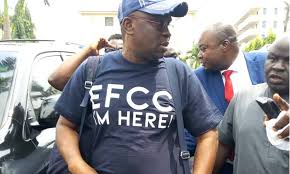
N6.9BN FRAUD: FAYOSE CLAIMS HE HAS NO CASE TO ANSWER IN COURT

By: Motunrayo Aniwura
Ayodele Fayose, the former governor of Ekiti State, has responded to the N6.9 billion fraud accusations the Economic and Financial Crimes Commission leveled against him by filing a no-case submission.
After hearing the no-case submission, Justice Chukwujekwu Aneke of the Federal High Court in Lagos reserved a decision.
Olalekan Ojo (SAN) represented Spotless Investment Limited as the second defendant, and Chief Kanu Agabi (SAN), a former Attorney General of the Federation, represented Fayose.
Through its attorney, Rotimi Jacobs (SAN), the EFCCm filed 11 charges against Fayose and the company that bordered on money laundering and theft.
At Monday’s proceedings, Fayose’s counsel, Agabi, argued the no-case submission dated July 16, 2025, insisting the EFCC had failed to establish a prima facie case against the ex-governor.
Agabi also pointed out that a central figure in the alleged transactions, Abiodun Agbele, was not charged alongside Fayose.
“The predicate offences on which these charges are based do not hold water,” Agabi said. “Criminal breach of trust and conspiracy are distinct charges, and no co-conspirator was docked with the defendant.”
Ojo, the second defense attorney, accepted the no-case submission that was submitted on March 21, 2025, and backed up by further documents on May 16.
He said that former Defense Minister Senator Musiliu Obanikoro, the prosecution’s thirteenth witness, had had his credibility severely damaged.
Ojo pointed out that Obanikoro had acknowledged during cross-examination that Fayose and Col. Sambo Dasuki, the former National Security Adviser, did not communicate directly, which undermined the prosecution’s case.
The prosecutor for the EFCC, Rotimi Jacobs (SAN), responded by pleading with the court to reject the no-case arguments.
He claimed that the defendants had not provided an explanation for the questionable financial activities, citing a written address and counter-affidavit dated May 8, 2025.
If the transactions were valid, Jacobs wondered why Fayose did not utilize his own bank account.
He referenced EFCC investigator Abubakar Madaki’s evidence, which alleged that Fayose utilized colleagues to buy properties in Nigeria and overseas. While Fayose claimed ownership of the properties in his statement, the associates later denied ownership.
“If the money was clean, why didn’t he acquire the properties in his name?” Jacobs asked.
Obanikoro’s testimony that Fayose personally asked for the money in cash and assigned Agbele to manage the delivery, he continued, necessitated a defense from the accused.
The court granted Fayose permission to fly overseas for medical treatment after the arguments were concluded, per Agabi’s request.
The case was postponed until July 10, 2025, by Justice Aneke in order to rule on the no-case submission.
In 2018, Fayose was first arraigned before the now-retired Justice Mojisola Olatoregun. Justice Aneke was later given the matter again.
The EFCC claims that Fayose stole $5 million in cash from Obanikoro and went around financial institutions to collect N1.2 billion to fund his 2014 election campaign.
In addition, he was charged with violating the Money Laundering (Prohibition) Act of 2011 by allegedly laundering more than N1.6 billion through proxies and businesses such as De Privateer Ltd. and Still Earth Ltd.
